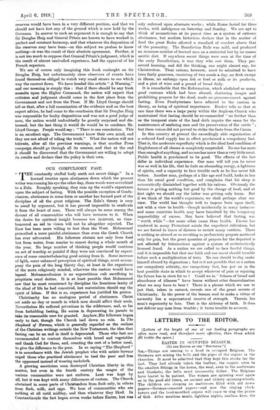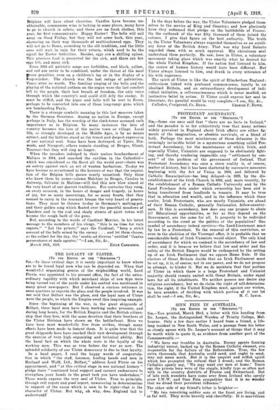LETTERS TO THE EDITOR.
[Letters of the length of one of our leading paragraphs are often more read, and therefore more effective, than those which fill treble the space.]
EASTER IN OCCUPIED BELGIUM.
(TO THE EDITOR or THE " SPECUTOR."1 Sit,—Things are coming to a head in occupied Belgium. The Germans are seizing the bells and the pipes of the organs in the churches. It must be admitted that they kept this stroke for the last. They had already taken the leather, the copper, even to the smallest fittings in the house, the wool, even to the mattresses and blankets; the bells must necessarily follow. The Belgians have learnt to be patient. The women are spinning wool again as in the good old times, on ancient and rickety spinning-wheels. The children are sleeping on mattresses filled with old news- papers—German-censored papers—and now the singing clock- towers and the loud-mouthed organs will cease to sing the praise of God. After meatless meals, lightless nights, coalless fires, the Belgians will have silent churches. Candles have become un- obtainable, communion wine is lacking in some places, many have to go to church in sabots, and there are no fresh clothes, this year, for first communicants. Happy Easter I The bells will sail away on Good Friday, but they will not come back, this year, showering on their way thousands of multi-coloured eggs. They will not go to Rome, according to the old tradition, and the little ones will wait in vain for their return, which used to be the signal for Easter festivities. Besides, eggs are a shilling apiece. This precious food is preserved for the sick, and there are few eggs left, and many sick.
Since 1914 all patriotic songs are forbidden, and black, yellow, and red are never to be combined, under the threat of the most pvere penalties, even on a children's toy or in the display of a b!iop-window. The church was the last refuge of patriotism. Tunes utter no words. The familiar singing of the bells and the playing of the national anthem on the organ were the last comfort left to the people, their last breath of freedom, the only voice Through which the country's soul could still defy the enemy. It must be stifled, and the pipes and bells will be sent to Essen, perhaps to be converted into one of those long-range guns which are bombarding Paris.
There is a strange symbolic meaning in this last measure taken by the German Governor. Among no nation in Europe, except perhaps in Italy, has the worship of the clock-tower assumed such importance as in Belgium. In many instances the love of country becomes the love of the native town or village. Local Life, so strongly developed in the Middle Ages, is by no means extinct, and the belfries stand as the truest and deepest expression of our national soul. Some have been destroyed, at Ypres, Dix- Elude, and Nieuport; others remain standing, at Bruges, Ghent, To-urnai—but they will sing no longer.
When the invaders indulged in their useless bombardment of "relines in 1914, and smashed the carillon in the Cathedral— which was considered as the finest all the world over—there was an outcry against such an act of wanton barbarism. To-day, we have become so accustomed to the horrors of war that the requisi- tion of the Belgian bells passes nearly unnoticed. Only those who knew them by name—solemn Melchior in Bruges, Carolus in Antwerp, Salvator in Malines—will feel this new blow aimed at the very heart of our dearest traditions. For centuries they rung, on every occasion, in the hours of danger and tragedy, in hours of joy, for so many mournings, for so many feasts, that they seemed to carry in the resonant bronze the very heart of genera- tions. They must be thrown to-day in Germany's melting-pot, and their golden song which floated over the peaceful meadows of Flanders and in the cool and shady streets of quiet towns will become the rough bark of the guns.
But, according to the words of Cardinal Mercier, in his latest message to the members of his clergy, "this is no time for vain regrets." "Let the priests," says the Carflinal, "keep a strict account of the bells seized by the enemy. .. and let them choose, as the collect for the day, the 'oratio ad diverse' entitled Contra perseeutores et male agentes.' "—I am, Sir, Lc.,



























 Previous page
Previous page